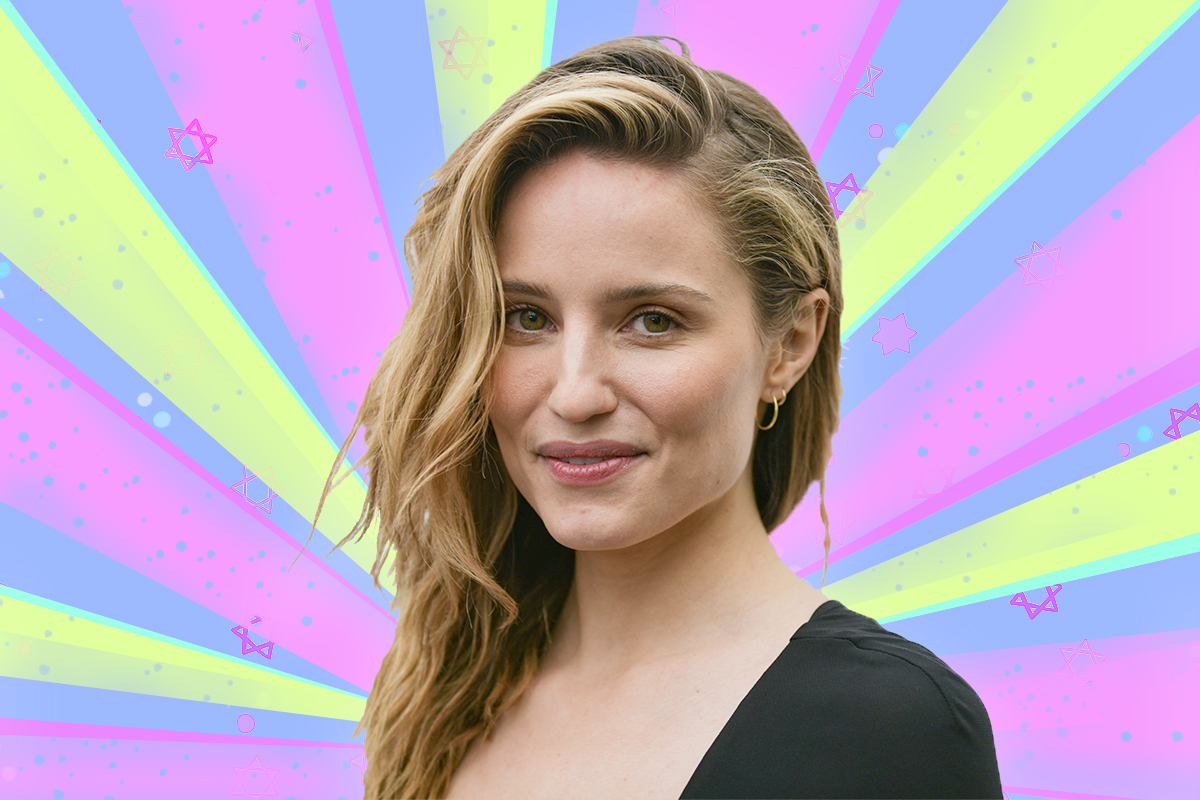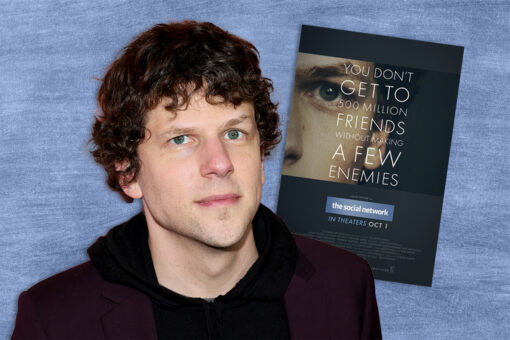Spoilers ahead for the film “As They Made Us”
Jewish actress Dianna Agron plays WASPy characters well.
She first found notoriety as Quinn Fabray, a pregnant cheerleader turned glee club nerd in the smash-hit musical comedy series “Glee.” Later, in the critically acclaimed and very Jewish film “Shiva Baby,” Agron plays Kim, the wife of the main character’s sugar daddy.
“My character was very much not Jewish. And that was kind of a point being made in that film,” Agron tells me when I speak with her via Zoom. “I remember thinking, oh, it’d be so fun to have my Judaism play into a character that I am experiencing.”
With “As They Made Us,” Mayim Bialik’s directorial debut, Agron is certainly getting that opportunity.
In the emotionally raw film partly based on Bialik’s own life, Agron plays Abigail, a 30-something woman desperately trying to heal her broken family in the wake of her father’s quickly deteriorating degenerative illness. Complicating matters is her overbearing mother Barbara (Candice Bergen), who is unable to grasp the reality of the situation; her brother Nathan (Simon Helberg), who has been estranged from the family for years; and her own father Eugene (Dustin Hoffman), who is revealed to have had an abusive streak during her childhood and teenage years. As if all that weren’t enough, Abigail is also juggling being a divorced mom of two, trying to find new love and move through a period of stagnation at her job.
Guiding Abigail through is her very visible and strong relationship to Jewishness. In the movie, we see Abigail say the Shema, the most important singular prayer in Judaism, with her sons regularly before bed. Additionally, Abigail proudly wears a Star of David necklace and her home is sprinkled with Yiddishkeit like menorahs. Her Jewishness is even a prominent part of her job – Abigail is a writer for a publication called “The Modern Jew.”
As Eugene’s condition continues to decline and he eventually dies, Abigail’s relationship with Judaism only grows stronger. In one scene, Abigail lulls her father to sleep with the Yiddish song “Voz Geven Iz Geven Un Nito” (in English: “What Was, Was, and Is No More”). Later, the Shema returns as Abigail coaches her mother through it when Eugene passes. And finally, at the gravesite, Abigail chooses to perform kriah, the Jewish mourning custom of tearing one’s garment, on her actual clothes as opposed to a ribbon provided by the rabbi.
That’s quite a lot of Judaism for a movie which doesn’t take on a specifically Jewish narrative. And it’s one of the reasons why Agron finds “As They Made Us” to be so unique.
“[Jewishness] is a thread throughout the story. It’s just more casually there,” Agron recounts to me. “And I think that that’s perhaps what I’ve been missing. I think oftentimes, when you’re telling Jewish stories, they relate to the past, they relate to the Holocaust, they are something that is much more focused as the plot of that kind of movie would be. And it’s nice to see it just there as a practice, and just there as another normal aspect of the character.”
The Jewish element was not the only reason “As They Made Us” emotionally resonated with Agron. When she was 15, Agron’s father was diagnosed with multiple sclerosis. It’s a part of her life that she has shared only fragments of with the media, including myself, but has so clearly shaped her life. But rather than shy away from it, the similarity to her own reality is actually what made her want to be a part of the project.
“I was sent the script and immediately felt so connected to it,” Agron shares with me. “There was a lot of personal truth in that character, in that world, especially as it relates to my dad. At this point, my dad has been sick for more years of my life than he’s been well. And so I felt finally ready to dip my toe in that pool.”
The audience should feel so fortunate that she did.
As Abigail, Agron delivers a spectacular, heart-rending performance. It is with expert precision and a deep authenticity that she embodies being a daughter, sister and woman barely holding on. As someone who has witnessed the decline of family members to degenerative illness, I was moved by a portrayal which Agron herself described as difficult, therapeutic and also not completely channeled from her own experience.
“Having the scene with Dustin where I’m potentially speaking to him for the last time, that was really beautiful and challenging, and kind of took me for a spin,” she replies when I ask about the hardest scene to film. “And you know, even though that is a moment I have experienced with my own father (not knowing if the moment in which I’m leaving him for that time being is going to be the last), it seemed to be so different — I wasn’t thinking about my own personal experiences at that moment. And then after we were done filming that scene, I went outside and had a big cry. And that felt personal.”
In spite of the challenges, it seems that “As They Made Us,” has come at a fateful time in Agron’s life. Over the last few years, the actress and singer has been reconnecting to her Jewish roots.
Growing up, Dianna and her brother, who are of Russian-Jewish descent, were raised as Reform Jews. (“Agron” was shortened from “Agronsky.”) Like any other Reform Jewish kids, going to Hebrew school and temple was a regular part of their practice. Interestingly, speaking as we did on the day before Purim brought to Agron’s mind a foggy recollection of playing Queen Esther sometime around bat mitzvah age in a temple production. (She adds that she wished she had time to make hamantaschen – stars, they’re just like us!) At 13, she became a bat mitzvah at Peninsula Temple Sholom in Burlingame, California.
“In the entire year leading up to my bat mitzvah, I would go and sit with the cantor; his room was very small and narrow. Truly, it felt like the space of your body was the only portion of the wall that was not covered in books,” Dianna remembers. “He was so delightful and so helpful. But that part of the process was always so comedic because it’s like, here I go into the book cave to sing songs.”
About her turn on the bimah, Dianna recalls feeling pride and recognizing it as a very circular moment – Rabbi Gerald Raiskin, who guided her through the ceremony, had also married her parents years earlier. Still, she also had a somewhat out-of-body experience through the whole thing, adding, “At 13 I was so gangly and had braces and was wearing heels and a dress kind of for the first time, and I was trying to stand in this feminine power, but I was also feeling sort of like an imposter.”
That feeling didn’t really dissipate at the party, which Dianna describes as “a calamity of errors” where she felt like “the biggest nerd in the world.”
“The DJ was playing all these kids songs and doing all these kid games. And it was like, no, we’re adults! We can’t be doing ‘put your right foot in and left foot out,’ like, please play some cool music,” Dianna says laughing. “I remember going to ask him very gently if that was possible, and him saying that he totally understood what I meant, but then like, doubling down on the kid games. And then, you know, I remember having a crush on a boy and just like… all of these things. There were so many pinches on both of my cheeks from all my relatives and I felt completely overwhelmed by the amount of attention. It’s fun and silly to look back on it and think about how worried I was that nobody was having fun because ultimately everybody was participating.”
In the years after her bat mitzvah, due to the combination of the onset of her father’s illness and her own budding career, Agron was not as “tapped into” her Judaism. Now, it’s something she’s returning to. Living in New York, Agron tells me that her circle of nearby Jewish friends and family has expanded such that it’s more accessible for her to engage with Judaism in meaningful ways. “I really love hosting Yom Kippur. I always find that to be a really special moment of the year,” Agron says, adding, “Even like a beautiful Shabbat dinner with friends with just simply saying prayers and candles and then sitting and having a wonderful conversation. I think it feels so grounding and unifying to put a lot of emphasis on family and friends and connection. I think it’s just really beautiful.”
With “As They Made Us” releasng this week, Dianna has already begun her next project – a two-week residency singing at the Carlyle Hotel café in New York – but it seems promising that she might pursue more Jewish roles in the future.
When I ask her what it meant to her to play such a visibly Jewish role in Abigail, especially in the face of rising antisemitism, Agron’s response still lingers in my mind:
“I’ve started wearing a Jewish star again, because I feel there were many years where, especially as a young person, I didn’t feel as comfortable being so prominently Jewish. And I think that has diminished greatly because I think that [Jewishness] is something that I’m proud of. And it’s something that really was so prominent and prevalent in my young life. I think it’s important to not be afraid.”
“As They Made Us” opens in theaters and VOD on April 8, 2022.



